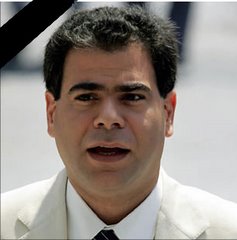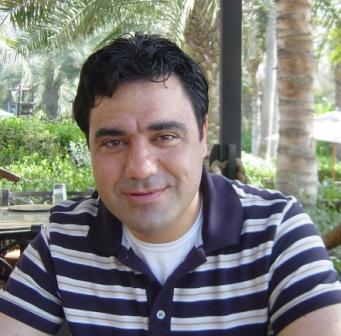Killing Lebanon, economically
By Michael Karam
And so to the latest tented village. That the Rafik Hariri-inspired downtown area should be the field of battle between what must be seen - wittingly or unwittingly - as those who want prosperity and those who wish to obstruct it, is sadly fitting. Say what you want about the late prime minister, he was a deal maker of the highest order. In his book "Killing Mr. Lebanon: The Assassination of Rafik Hariri and Its Impact on the Middle East," Nicholas Blanford describes Hariri as "a corrupter rather than corrupt." That kind of behavior might be beyond the pale in Western politics, but compared to his colleagues in Parliament and the Cabinet, Hariri was an angel. He was the self-made prodigal son who rode into town on the back of a billion-dollar fortune, and set about realizing his dream to transform Lebanon into what he saw as its rightful position as Hong Kong of the Middle East.
But on Saturday night, while trying to make my way to the Hamra neighborhood from Achrafieh, I took a wrong turn and found myself somewhere I didn't want to be: near Riyad al-Solh Square, where opponents of the government have been protesting since last Friday. It was more Dante than downtown, as I watched a nation deliriously assisting in its own suicide. Was it really meant to be that way?
Crunch the numbers and it becomes obvious that this is neither the time nor the place for such a jamboree. Lebanon's total debt stands at $39.4 billion, a year-on-year increase of 6.9 percent. The debt-to-GDP ratio is a staggering 190 percent. PM Fouad Siniora, a banker by training, is aware of the urgency of reform. He is also acutely aware that nearly 30 percent of government spending goes to servicing the debt. There is a $3 billion deficit in public finances and even more worrying is the imminent maturity of $5 billion worth of government bonds in 2007.
The Paris III economic conference, already a year late, looks like being postponed once again. Rating agencies have given Lebanon a negative outlook and any delay in Paris III without a definite new date will see an automatic downgrade to a CCC rating - one step away from a default, putting Lebanon on par with the likes of Belize, Ecuador, Cuba, Moldova, Nicaragua and Paraguay.
Without a donor conference the Lebanese Treasury will have to refinance its debt at much higher rates, as there will be few if any takers with an appetite for Lebanese risk. Any inability to refinance could see Lebanon "do an Argentina." True, the Central Bank could mobilize its foreign currency reserves, but that would leave the Lebanese pound exposed. Sadly the country might not be able to fight on two fronts. Remember that during the summer war, Saudi Arabia and Kuwait gave Lebanon $1.5 billion to defend the pound; otherwise the currency would have nosedived.
If the Siniora government is toppled then Lebanon could be in for it. There would no doubt be increased political tension within the country, and with Israel, and major economic reform, the single most important obligation international donors have imposed on Lebanon, could be blocked by Hizbullah and its allies. There would be a massive flight of financial and human capital and the gains of the past six years could evaporate.
At the moment, Paris III is scheduled for January 25, 2007. Lebanon needs a minimum of $4 billion to avert a slide, and ideally $8 billion to finance reconstruction and pay back its $2.4 billion Paris II loan that matures this month. The conference was meant to happen in January 2006, so time is of the essence. Siniora's is the only government that has so far demonstrated a commitment to economic and fiscal management of the country. The prime minister has the tools to reduce the fiscal deficit and debt and create growth - primarily by privatizing the two telecom companies, the national electricity grid, and Middle East Airlines. He has pledged to increase taxes and encourage investment. Even on a "good day" it is estimated that Lebanon looses $1 million for every day it stalls in carrying out economic reform. Does the opposition care about such figures? One wonders.
The resurgent Beirut Stock Exchange looks likely to suffer from a prolonged political crisis, especially as Gulf markets are also falling off. Three Lebanese banks - BankMed, Credit Libanais, and Lebanese Canadian Bank - were considering listing in early 2007, one year after they had originally planned to do so. In the current climate they will wait even longer. And let's not forget that because of the summer war, 35-40 percent of the exchange's market capitalization was rubbed out. It is still falling.
Lebanon's other sectors can ill afford political gridlock. Tourism, which at conservative estimates represents 10 percent of GDP, will be out for the count if this situation continues for much longer. Lebanese industry is also punch drunk. Any gains the sector made in the first half of 2006 - 51 percent growth in exports by all accounts - were wiped out during the war. Fighting also cost the sector $1.1 billion and damaged 142 plants. The outlook for 2007 is not good: Both tourism and industry are expected to shed jobs.
Yes, the economy is hurtling to hell in the proverbial hand basket. Latest estimates put crisis losses at $70 million a day with roughly 7,000 jobs on the line. Lebanon's image as the region's party town is evaporating faster than you can say Bacardi Breezer, while brand Lebanon, which nearly two years ago oozed with equity, is looking very brittle. A widely televised war, a gangster-style assassination in broad daylight, and the sight of soldiers behind razor wire defending a holed-up Cabinet are not good for business, and whether we like it or not business is what makes Lebanon.
Michael Karam is managing editor of Executive magazine, a regional business monthly. He wrote this commentary for THE DAILY STAR.
i've to add that 80% of the new protestors are not paying any taxes for their houses, neither electricity bills nor traffic... they have more than 20,000 mid-range missles and receive financial aid from Iran... if you want to know the Lebanon they are looking for just visit the area where they lived... you'll be shocked
Peace,
G.
Tuesday, December 05, 2006
Subscribe to:
Post Comments (Atom)





No comments:
Post a Comment